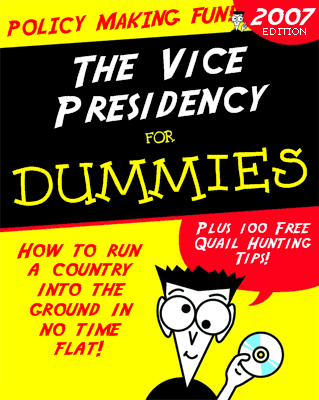
And Cheney, don't worry that you'll be left out at all... I just finished writing YOUR special guide as well!
 Copyright © 2006 Aaron S. Cook
Copyright © 2006 Aaron S. Cook
The Big Red Button
Want to put the Big Red Button your blog or website? Here's how to do it in just 2 easy steps:
THE BIG RED BUTTON HTML CODE:
NOTE: Blogger users - If you get a "HTML cannot be accepted: Tag is not closed" error, just ignore it of course. ;)

1. The interest level of the visitor is maximized by matching the right visitor, with the right offer, at the right time.
2. The attractiveness of an offer includes the proposed value, in addition to how well it's presented to the visitor.
3. The visitor's ease of completing the desired action is very much dependent on the website's usability (user-friendliness), which includes:
Marketing Secret: It's definitely worth pointing out that small, impulse items will generally have a higher conversion rate than large shopping items will!
Write your ads for sales conversions, NOT for clicks!
This is very important! Personally, I see way too many ads that actually try to trick people into entering a website. They say things like, "Free Ringtones Here!" Or, “Get Your Free Ringtones!”
Well, of course this can get you tons of clicks, but will it get you conversions??? Remember, you're paying PER CLICK with your advertising, so you definitely want to make certain those clicks count!
So with the Ringtones, for example, let's take a look at the facts of the offer:
Use these to write an ad that will convert at a higher percentage!
An example of a bad ad would be: "Get Free Ringtones - Just Click Here For Free Ringtones!
An example of a good ad would be: "Get 15 Free Ringtones – Just enter your phone number and receive your Free Ringtones!"
Another example of a good ad would be: "Free Ringtones – Get 15 Free Ringtones with each new subscription!"
Bottom line…
Don't ever attempt to trick or fool your customers! If you do, your ads will surely get the costly clicks, but they will not convert into sales. And your potential customers will leave your site the second they think you're trying to pull a fast one on them!
And the overall result? ...Many clicks, but very few sales. Being 100% straightforward will definitely generate many more sales for you! :)


If you're telling your business prospects how much you make, how much they can make, how much your upline makes, etc., it could get you and your company in some hot water with the Federal Trade Commission (FTC).
Let's face it - distributors are out there waiving checks and 1099s, telling prospects what they and others have made, and presenting hypothetical (i.e., astronomical) examples of the phenomenal incomes that can be earned with your company. Is this potentially problematic for distributors and the company? Absolutely.
Two states, Massachusetts and Wyoming, have statutes that expressly limit or even prohibit income claims. Moreover, the consumer protection acts of all states prohibit any type of promotional activity that is misleading, unfair, or unsubstantiated.
Finally, notwithstanding a company's substantial good faith compliance, the Federal Trade Commission (FTC) is gleefully snuffing direct sellers out of existence if it finds only a handful of distributors making improper income claims.
So let's address exactly what companies may legally do. The bottom line is that direct selling companies may publish flyers, articles, and other printed media, and produce audio and video presentations containing income claims, provided that they include the elements set forth below relative to the type of claim that is made.
A. Statements of Average or Median Earnings
(1) a true statement;
(2) of the average or median earnings;
(3) actually achieved;
(4) by ALL distributors; and
(5) during any stated recent time period.
1. Last year our distributors earned an average of $_____.
2. In 2002 our distributors earned an average of $_____.
3. For all of 2002 our distributors earned an average of $_____ per month.
4. In May, 2002, our distributors earned an average of $____.
B. Statements of Non-Average, Non-median Earnings Achieved by a Substantial Number of Distributors
(1) a true statement;
(2) of any particular amount of earnings;
(3) actually achieved or exceeded;
(4) by a substantial number of distributors;
(5) during any stated time period; and
(6) provided that it is accompanied by;
(a) a clear and conspicuous disclosure of the percentage of the total number of distributors who have achieved or exceeded such results; and
(b) is printed in a type size at least equal to that of the statement of sales, profits, or earnings of the percentage of the total number of distributors who have achieved such results.
As regards statements of non-average, non-median earnings achieved by a substantial number of distributors, the Commission provided the following:
1. Last year at least 585 of our distributors (___% of all our distributors) earned $____ or more.
2. In 2002, ___% of our distributors earned $____ or more.
3. In all of 2002, hundred of our distributors (____% of all distributors) earned an average of $____ or more per month.
4. In May, 2002, at least 600 of our distributors (____% of the total) earned $____ or more.
The FTC has not attempted to define the term "substantial" for the purpose of income claims within the context of direct selling.
C. Statements of Earnings Ranges
(1) an accurate representation;
(2) of a particular range or ranges of earnings;
(3) actually achieved;
(4) during any stated time period;
(5) provided that it is accompanied by;
(a) a clear and conspicuous disclosure of the percentage that such distributors achieving results within the range constitute of the entire number ALL distributors; or
(b) in the event that the company employs ranges beginning with $0 and proceeding continuously upward, it need only indicate either the number or the percentage of distributors within each range; and
(6) the disclosure [5(a) or 5(b) above] is printed in type size at least equal to that of the statement of ranges of the distributors who have achieved such results.
Examples of claims involving ranges that were provided by the FTC include:
1. In 2002, (number) of our distributors ((____%) of all our distributors) earned from $5,000 to %10,000.
2. In April, 2002, ____% of our distributors earned from $250 to $500.
3. In the first 9 months of 2002, (number) of our distributors (____% of the total) earned from $500 to $1,000 each month.
D. Income Testimonials
To make income testimonials, the company must ensure that any such testimonial includes or is accompanied by the following clear and conspicuous disclosures (if printed, in boldface type at least equal in size to that of any sales, profits, or earnings figure stated in the testimonial):
(1) an accurate statement of the average amount of time per day, week, or month required by the distributor to achieve the stated results;
(2) an accurate statement of the year or years during which, and the geographical area(s) in which, the stated results were achieved;
(3) if the results achieved by the distributor providing the testimonial have not been achieved by at least 10 percent of ALL distributors during the time period covered by the testimonial:
(i) a statement of the average or median sales (or profits or earnings, whichever is included in the testimonial) of ALL distributors during the time period covered by the testimonial; or
(ii) the following statement: IMPORTANT NOTICE: THE RESULTS DESCRIBED ABOVE ARE SUBSTANTIALLY IN EXCESS OF THE AVERAGE RESULTS ACHIEVED BY ALL OUR DISTRIBUTORS. OUR RECORDS SHOW THAT ONLY ____% OF OUR DISTRIBUTORS HAVE EQUALED OR EXCEEDED THE PERFORMANCE DESCRIBED ABOVE DURING THE INDICATED TIME PERIOD; and
(4) if the results achieved by the distributor providing the testimonial have been achieved by 10 percent or more of all distributors during the time period covered by the testimonial, but are in excess of the average or median results achieved by all distributors:
(i) a statement of the percentage of all the company's distributors who, according to its records, have achieved equal or better results during the same time period; or
(ii) a statement of the average or median results achieved by all distributors during the same time period.
Examples of proper testimonials provided by the Commission include:
1. In 2002, Jane Doe earned $____in the New York metropolitan area, spending an average of _____ hours per week on the job. The average earnings for all our distributors during the same period were $_____.
2. In 2002, John Doe earned $____ in the Chicago metropolitan area, spending an average of ____ hours per week on the job. Fifteen percent of all our distributors did as well as or better than John that year.
Because direct selling distributors usually have no access to the numbers and averages required to make permissible income claims, they should be strongly discouraged or prohibited from doing so... unless the company provides the proper information and training to them, and the distributors provide that information to their prospects.
In light of the overwhelming likelihood that your distributors are making income claims, I emphatically encourage you to prepare an income disclosure statement that contains the information discussed in this article.
E. Lifestyle and Hypothetical Claims
In addition to express income claims, two popular marketing techniques for promoting a compensation plan are "lifestyle" and hypothetical income representations.
A lifestyle claim typically includes pictures or statements involving large homes, luxury cars, exotic vacations, or other items suggesting or implying wealth. Claims such as "My XXXX income exceed my salary after six months in the business," or "Our XXXX business has allowed my wife to come home and be a full-time mom" also fall with the purview of "lifestyle" claims.
"Lifestyle" claims were addressed in the Amway case, and defined as "claims which generally consist of vague references to the achievement of one's dreams, having everything one always wanted, etc. - are phrased in terms of 'opportunity'or 'possibility' or 'chance.'"
A hypothetical claim exists when a company or distributor attempts to explain the operation of the compensation plan through the use of a hypothetical example.
Certain assumptions are made regarding the: (1) number of distributors sponsored; (2) number of downline distributors; (3) average product volume per distributor; and (4) total organizational volume. Cranking these assumptions through the compensation plan yields an income figure.
Regulators have made abundantly clear that they take the position that lifestyle and hypothetical income statements are, at a minimum, implied claims. Thus, they constitute income claims. Accordingly, they trigger the same disclosure requirements as do express earnings representations.
To use a hypothetical income example in which the amount of stated profits, earnings, or sales in excess of the average profits, earnings, or sales of all distributors the company must clearly and conspicuously disclose (if printed, in boldface type at least equal in size to that of any sales, profits, or earnings figure stated in the example):
(1) the average profits, earnings, or sales for all distributors; or (b) the percent of all distachieved such actually achievedsuch stated profits, earnings, or sales.
F. Definition of "Average"
The computation of "average" earnings must not be based on less than all distributors as a whole, or all distributors in the stated category (i. e., a certain rank of distributor), unless the fact that some distributors are excluded and the basis for any such exclusion are clearly and prominently disclosed in close proximity to such representation.
In light of the FTC's recent enforcement activities, however, I strongly recommend that companies indicate the percentage that the "reported" distributors constitute relative to all distributors.
G. Record Keeping Requirements
Direct sellers must maintain records that substantiate that any representation made regarding past or present earnings are accurate. Such records must be sufficient to:
(1) substantiate the accuracy of any representations made regarding amounts earned;
(2) the number or percentage of distributors achieving such results;
(3) the time period during which such results were achieved; and
(4) the amount of time per day, week, or month required to achieve such results.
Conclusion
The issue of income claims and earnings representations is a "bet the farm" proposition. The life of a company can be jeopardized by improper claims.
It is imperative that corporate executives and distributors realize that income claims are first and foremost, a legal exercise. They are only secondarily, and a very distant second at that, a sales and marketing exercise.
When it comes to income claims, more disclosure is infinitely better than less. Do not play games. Do not spin or position the numbers. Do not try to be cute. Just tell it like it is -- all of it!
Source: MLM Lawyer, Grimes & Reese, P.L.L.C.
